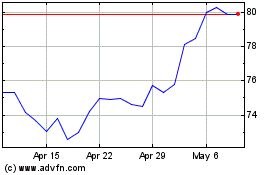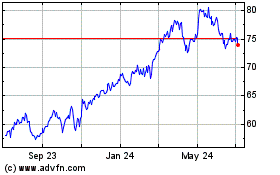AIG CEO Rebuffs Idea of Breaking Up Company -- 2nd Update
November 03 2015 - 11:18AM
Dow Jones News
By Leslie Scism and Erik Holm
The head of American International Group Inc. said management
and the board had on many occasions reviewed the idea of breaking
up the insurer and concluded that such a move "did not make
financial sense."
The comments from AIG Chief Peter Hancock, made in a conference
call with analysts and investors Tuesday, were his first since
activist investor Carl Icahn sent a letter last week urging the
company to split into three pieces. Mr. Icahn argued that splitting
apart would reduce the company's regulatory burden.
On Tuesday, Mr. Hancock said that assumption wasn't true. The
"assumed outcome" under Mr. Icahn's proposal is the ability to
return more capital to shareholders, but he said the company's
designation as "systemically important" by a panel of federal
regulators "has not limited our ability to return capital."
What's more, financial-institution ratings agencies like the
stability and diversification of a combined company, Mr. Hancock
said. Due to ratings-agency concerns, smaller companies would
likely return "less capital" not more, he said.
Mr. Hancock said AIG sees a "tremendous benefit" in having a
combined life and property-casualty operation, and that a split
would be a distraction from the company's cost-cutting
initiatives.
He said AIG's management would meet with Mr. Icahn to share its
conclusions "and give him an opportunity to elaborate on his
views."
Mr. Icahn didn't immediately respond to a request for
comment.
Mr. Icahn and hedge-fund billionaire John Paulson have argued
that by dividing AIG into smaller pieces, AIG could escape its
federal designation as a systemically important financial
institution. The label indicates the government believes the
company could pose risks to the broader economy during a crisis. It
brings with it heightened scrutiny and requirements to hold robust
capital buffers against unexpected losses.
Paulson & Co. partner Charles Murphy said in an emailed
comment Tuesday after the call that the "status quo is not
acceptable" given the company's worse-than-expected third-quarter
results, which missed "by a wide margin the very low goals"
previously set by AIG. The Paulson firm has "little confidence in
management, strategy and structure," adding that it continues to
want to see spinoffs to shareholders of some of AIG's businesses,
more divestitures and additional capital returned to
shareholders.
Asked Tuesday whether the company's designation as systemically
important was causing the firm to hold more capital, Mr. Hancock
responded: "definitively no."
"We anticipated this designation before we exited the
government's cradle," he said, referencing the government bailout
of AIG during the financial crisis. The company has already
completed what he said were massive divestitures. Unlike other
systemically important financial institutions that are de-levering
now, "we got that done by the end of 2011."
Since 2008, the company has sold more than 30 businesses for
more than $90 billon, he said.
Mr. Hancock said the company continues to looks for ways "to
reduce cost and complexity" of AIG. "There are no sacred cows and
we consider all avenues to improve shareholder returns," he
said.
AIG shares are down 4.7% to $60.76.
Write to Leslie Scism at leslie.scism@wsj.com and Erik Holm at
erik.holm@wsj.com
Subscribe to WSJ: http://online.wsj.com?mod=djnwires
(END) Dow Jones Newswires
November 03, 2015 11:03 ET (16:03 GMT)
Copyright (c) 2015 Dow Jones & Company, Inc.
American (NYSE:AIG)
Historical Stock Chart
From Mar 2024 to Apr 2024

American (NYSE:AIG)
Historical Stock Chart
From Apr 2023 to Apr 2024
